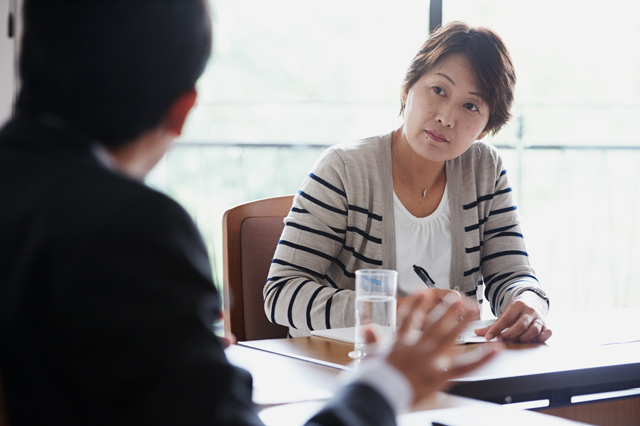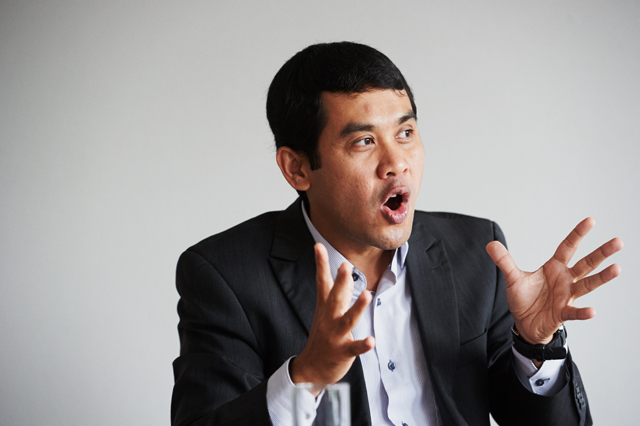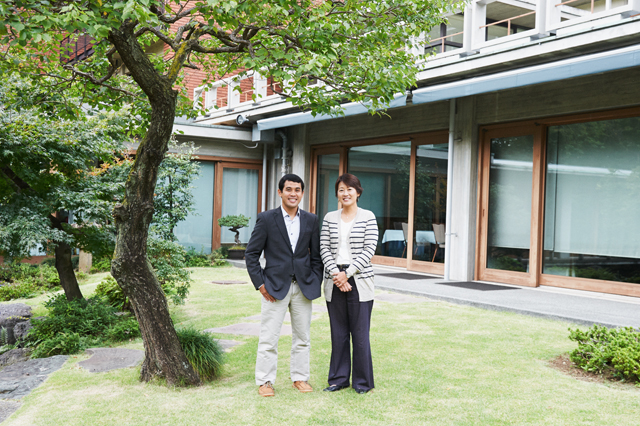Japan and Islam—The Halal Issue
Emiko: I also would like to ask you about Japanese society and Islam, especially what you have found through your interviews about Halal*4 in Japan.
*4 The word Halal literally means "permissible" and is translated as "lawful" in Islamic law (sharia). It refers to the Muslim way of life from legal matters to the everyday life such determining permissible food and beverages for its followers.
Ayang: First of all, I thought the policy of the Japanese government toward Muslim communities is very warm and welcoming. I felt that there is little Islamophobia in Japan or, at least, the degree is certainly not that high as European countries. As I lived for seven years in Europe as a Muslim, I have become to understand how Islamophobia happens in a non-Muslim country. There, I observed Islam as a victim and target of criticism every day. Media plays a critical role in this. Why don't European and American media turn their eyes to the peaceful image of Indonesian Islam instead? Why do they always take up conflicts in the Middle East as if they represent the whole of Islam?
I am happy that Japan's view on Islam is wide open to Southeast Asia. Nowadays, the majority of non-Japanese Muslims who reside in Japan are Indonesian, so Indonesian Muslims here can contribute to provide a good impression of Islam for the Japanese society. My second impression, to be honest, is that information about Islam is not well-spread here in Japan. I found many Japanese do not know about Islam as a religion. Actually this was revealed during my research on Halal in Japan.
Emiko: I heard so many Japanese companies and businesses are interested in dealing with Halal now. Why is this, do you think?

Ayang: After conducting many interviews and observations, I found that, for the business practitioners, Halal is something that is profitable. They are not interested in Halal itself, dealing with the Islamic teachings and Islam as a religion. I don't criticize it though as it can be a door to introduce Japanese people to Islam.
Emiko: You said that now there are so many organizations that issue Halal certificates but people don't really know what Halal itself is. Don't you think that can create problems?
Ayang: Yes, when I started to conduct my research, I got confused because in Muslim countries, there is only one single authority that certify Halal and issue a Halal certificate. In Indonesia, for example, the sole authority lies with the Majelis Ulama Indonesia [The Indonesian Council of Ulama]. It is the same in Malaysia, Egypt, and Saudi Arabia. In Japan, however, there are many Halal organizations and associations. But I can understand that situation because Japan is not a Muslim country. Besides, the government cannot intervene in religious matters as it is forbidden by the constitution. This situation has allowed Muslim communities or Japanese who are interested in dealing with Halal to establish their own Halal associations or organizations. At the same time, it has created a chaotic and messy situation, as well as tension among those concerned. For your information, based on my research, there are in fact less than ten active halal certification organizations in Japan.
Emiko: What is your recommendation to improve the situation?
Ayang: First, all these Halal organizations should gather in one assembly and create one single Halal consortium. My second suggestion is to create a Japanese council of ulama. If they cannot find a Japanese ulama, they may invite the Indonesian ulama to sit in that council. Once this Japanese council of ulama is created, they will make the standards for Japanese Halal. Then all the decision of the Japanese council of ulama will be followed by this Japanese Halal consortium. Currently Japanese companies really get confused as to which association they should go to, and which standard they should follow. During my research, I found one or two organizations that even sell Halal certificates to Japanese companies. I must say that that is against sharia (Islamic law). Halal certificates are not for sale, but are something that are given to you, to permit and allow you to produce one specific product that is in compliance with sharia. Again, creating a Japanese council of ulama may be the solution to prevent this kind of misunderstanding; a council based on "Japanese Islam" which embraces Islam as a religion of your philosophical way of life while also respecting Japanese culture and traditions.

Emiko: What did you think and learn from participating in the Asia Leadership Fellow Program? And what are your future aspirations or message to the younger generations in Japan and Indonesia?
Ayang: I learned a lot from this program. The most important thing is that I met with other Asian fellows and discussed many issues with them. I found that we have many commonalities, be it positive or negative. For the younger generation both in Japan and in Indonesia, I recommend that they visit each other and travel together in these two countries. Japanese students can visit Indonesian schools or Islamic boarding schools. In 2030, Indonesia will have almost 300 million people while Japan will become a super-aging society. The Japanese government may consider opening its doors toward immigrants and one of the people you may want to welcome are the Indonesians, as we easily adopt new values. We have to work closely and cooperate together to produce fruitful results for both countries; not only for Japan, but also for Indonesia.
Emiko: Thank you so much for today. I was very impressed by your passion and sense of responsibility which made you decide to jump into the world of grassroots education after getting a high level of education abroad.
When the religious extremists threaten the world and prejudice and misunderstanding against Islam are spreading, it is encouraging for us to know such an internationally active young Muslim leader of Indonesia is trying very hard to disseminate mild and tolerant Islam and educate young people with a broader vision.
I am looking forward to reading your paper on the Halal issue of Japan.

At the International House of Japan, on October 25, 2016
Interviewer: Emiko Fujioka
Emiko Fujioka is the secretary general and co-founder of the Fukushima Beacon for Global Citizens Network (Fukuden), a Fukushima-based non-profit organization. Fukuden's main mission is to share the lessons learned from Fukushima after the nuclear accident with the world from the citizen's viewpoint. Served at the Shapla Neer Bangladesh Office as a country representative from 2005 to 2009. Moved to Fukushima from Tokyo in 2012 as a member of the disaster response task force of the Japan NGO Center for International Cooperation (JANIC) and started Fukuden after JANIC closed its operations in Fukushima in 2014. Also a board member of Shapla Neer=Citizens' Committee in Japan for Overseas Support, an NGO working for underprivileged people in South Asia. Fellow of Asia Leadership Fellow Program (ALFP) in 2016.
Editors: Kazumi Yagi, Kana Yamanishi (The Japan Foundation Asia Center)
Plates: Courtesy of Ayang Utriza Yakin
Photo (Interview): Jouji Suzuki






